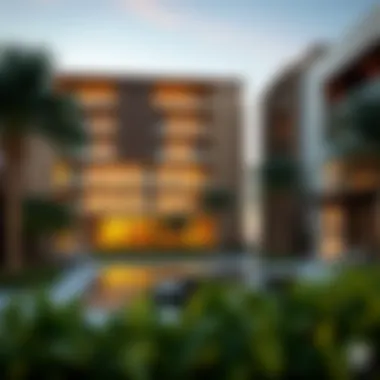Understanding Residence Permits in Dubai for Expats


Intro
Navigating the complexities of residence permits in Dubai is essential for potential expatriates, investors, and anyone looking to establish roots in this vibrant city. Over the years, Dubai has transformed into a global hub for business and tourism. The residence permit system reflects this dynamic growth, providing various pathways for long-term living in the emirate. From employment to family reunification, and property ownership, understanding the nuances of these permits is crucial for making informed decisions.
As we delve into this topic, we will explore market trends that shape the landscape of residency, investment opportunities that can yield high returns, and practical guidance on application processes. Each section aims to equip you with the insights necessary to navigate the residence permit system effectively. Let's set the stage for a comprehensive understanding of what it means to reside in one of the most sought-after cities in the world.
Market Trends
Current Property Prices
The real estate market in Dubai exhibits a characteristic volatility, reflecting both local and international economic factors. At present, property prices in popular districts such as Downtown Dubai and Dubai Marina remain robust, with average prices fluctuating depending on the area's specific attributes and ongoing developments. For example:
- Downtown Dubai: Prices for apartments can hover around AED 2,000 to AED 3,000 per square foot.
- Dubai Marina: This district also sees prices in a similar range, depending on the view and amenities associated with each property.
The ongoing development of infrastructure and commercial enterprises contributes to the resilience of these property values. The government's commitment to improve connectivity and tourism potential, such as the recent expansions of the Dubai Metro, further supports property demand in these key areas.
Future Forecasts
Looking forward, the prospects for the Dubai real estate market appear optimistic. Analysts predict that the city will continue to attract both expatriates and investors, driven by its economic stability and luxury lifestyle offerings. The implementation of new policies encouraging foreign investment and residency could further bolster property demand.
"In Dubai, the only thing that's constant is change; potential for growth is limitless."
Moreover, as the city gears up for major events like Expo 2025, there's expected to be a surge in property interest as more people look to establish residency to partake in the opportunities that lie ahead.
Investment Opportunities
High-ROI Areas
Investors seeking high returns on investment can focus on emerging neighborhoods such as Dubai Creek Harbour and Mohammed Bin Rashid City. These areas are gradually gaining traction due to their prime locations, modern facilities, and planned community features. Properties in these regions generally offer a lower initial investment compared to established areas, with the potential for substantial appreciation over time.
- Dubai Creek Harbour: Emphasizing waterfront living, residents can enjoy proximity to parks and leisure activities.
- Mohammed Bin Rashid City: This exclusive community is designed for luxury living, offering potential for both rentals and resale.
Financing Options
For aspiring investors, there are numerous financing options available to help realize property ownership dreams in Dubai. Many banks offer home loans specifically tailored for expatriates. Here’s a quick overview of common financing routes:
- Long-term mortgages with competitive interest rates, often up to 80% of the property value, can be accessed by expatriates.
- Islamic finance options, which comply with Sharia laws, are increasingly popular among those looking for ethical investment avenues.
Additionally, leveraging the expertise of real estate advisors can provide invaluable insights into the best financing options tailored to individual circumstances.
In summary, understanding the residence permit landscape in Dubai involves not only navigating permits but also real estate trends and investment opportunities that can empower potential residents in their journey.
Foreword to Residence Permits in Dubai
In today’s world, the allure of Dubai as a global city is undeniable. With its soaring skyscrapers, vibrant culture, and thriving economy, it draws people from around the globe seeking new opportunities. However, embarking on this journey requires more than just ambition; it necessitates understanding the landscape of residence permits. These permits are not merely pieces of paper, but gateways to a new life in the UAE, providing expatriates and investors with rights, protections, and opportunities that are essential for long-term success.
Understanding the Legal Framework
Navigating Dubai's residency landscape starts with grasping its legal framework. The UAE has established a structured system for issuing residence permits that varies by category. Each permit type, whether it be employment, family sponsorship, or investor residency, has its own set of laws and regulations.
The government, through the General Directorate of Residency and Foreigners Affairs (GDRFA), outlines these regulations, aiming to balance the influx of foreign talent with the objectives of national economic growth. Prospective residents must familiarize themselves with documentation requirements and eligibility criteria tailored for each type of permit.
Furthermore, a legal understanding aids individuals in avoiding traps and pitfalls, ensuring compliance with local laws. This foundation not only supports a smoother application process but also helps in making informed decisions post-residency, such as in areas of employment and property ownership. Such knowledge becomes invaluable in clarifying both rights and responsibilities under the UAE’s legal parameters.
Importance of Residence Permits for Expatriates
For expatriates, obtaining a residence permit is often a pivotal step in solidifying their presence in Dubai. It facilitates not just legal residency but a sense of belonging in a country where cultural integration can sometimes feel like a tall order. Moreover, residence permits open doors to numerous benefits:
- Legal Employment: Without a permit, individuals might find themselves in a precarious situation, leaving them unable to work legally, affecting both their financial stability and career aspirations.
- Healthcare Access: Residents gain access to a variety of healthcare services, ensuring that unforeseen medical issues don’t result in financial disaster.
- Social Benefits: A residence permit grants rights to social security, schooling for children, and optional pathways for family reunification.
In essence, residence permits are crucial for ensuring that expatriates and their families can thrive in Dubai. They remove the uncertainty of their legal status, allowing individuals to focus on building their careers, forging social bonds, and investing in their future.
"Understanding the ins and outs of Dubai’s residence permits can be the difference between thriving and merely surviving in this bustling metropolis."
Having a thorough grasp of these permits empowers expatriates to embrace the numerous opportunities the city has to offer. As individuals prepare to embark on their Dubai adventure, they must recognize the significance of securing the appropriate residence permit, paving the way for an enriched experience, both personally and professionally.
Types of Residence Permits
Understanding the various types of residence permits is a critical element of navigating life in Dubai, especially for expatriates and investors. Dubai's residence permits serve as key gateways for many who wish to live, work, invest, or reunite with family in this vibrant city. Each category comes with unique criteria and benefits, addressing the needs and aspirations of a diverse population seeking new opportunities in the UAE.
Employment Residence Permits
The Employment Residence Permit is essential for expatriates looking to work in Dubai. It's a crucial piece of paperwork that allows foreign nationals to be legally employed within the emirate.


To qualify for this permit, the individual typically needs a job offer from a Dubai-based employer who will act as their sponsor. The employer must fulfill specific legal obligations, such as ensuring the employee has the necessary skills for the position.
Benefits:
- Legitimacy: This permit confirms your right to work, making it easier for you to access bank services, rent property, or even purchase a vehicle.
- Family Sponsorship: Holders often have the option to sponsor family members, creating opportunities for spouses and children to also live in Dubai.
- Health Insurance: Many employment contracts include health insurance, a crucial aspect of settling into a new country.
The processing time and fees for an Employment Residence Permit can vary, significantly influenced by the employer's compliance with local laws. Therefore, expatriates should liaise closely with HR departments throughout the application process.
Investor and Business Owner Licenses
For those looking to invest or start a business, the Investor and Business Owner Licenses are pivotal. These permits are tailored for individuals wishing to set up their own enterprises in the UAE's booming market.
Obtaining this license allows investors to not only operate a business but also to gain residence status, ultimately opening doors for long-term investment in Dubai’s commercial landscape.
Considerations:
- Investment Minimums: Depending on the business type, certain financial thresholds must be met, which can be a barrier for some budding entrepreneurs.
- Local Sponsorship: Some business sectors may require a local partner or a UAE national to fully comply with Dubai’s regulations.
- Potential Wealth Growth: With its favorable tax environment, owning a business in Dubai can significantly enhance one’s financial portfolio.
Investors must pursue thorough market research and guidance from local experts to ensure compliance with the increasingly competitive regulatory landscape.
Retired Persons Visa
The Retired Persons Visa has emerged as an appealing option for individuals looking to settle down in Dubai after their working years. It facilitates residency for retirees, particularly from the UK and other countries, who seek a warm climate to enjoy their retirement.
This visa is generally available for individuals over a certain age, typically 55, and usually requires verification of financial sustainability through savings or a monthly income.
Advantages:
- Quality of Life: Dubai offers an excellent standard of living, which is a significant draw for retirees seeking comfort and safety.
- Healthcare Benefits: Retirees can access high-quality healthcare services, an important consideration for those in their golden years.
- Community Engagement: There are many clubs and activities for retirees, fostering a sense of community and belonging.
It's important to note that the Retired Persons Visa may require upfront funds, providing proof that the individual can sustain their lifestyle without working.
Family Sponsorship Visas
Family Sponsorship Visas allow expatriates who already hold a residence permit in Dubai to bring their family members to live with them. This dimension of residency caters to those who emphasize family ties in their relocation plans.
The criteria for these visas hinge on the sponsor’s residency status, income level, and a commitment to financially support the family members.
Key Points:
- Quality of Life Together: Expats find solace in having their families with them, enhancing their living experience.
- Educational Opportunities: Sponsored children can access schooling in Dubai, providing them with a robust educational foundation.
- Social Integration: Families can better adapt and immerse themselves in Dubai's rich culture together.
While residency through family sponsorship is generally straightforward, sponsors need to ensure they meet the requisite income thresholds and provide adequate documentation for successful approval.
The landscape of residence permits in Dubai is complex but crucial, as each type serves unique needs, shaping how expats and investors experience life in this dynamic city.
The Application Process
The application process for residence permits in Dubai is a crucial step for expatriates and investors alike. Understanding this process not only helps in minimizing delays but also ensures compliance with local laws. In a city known for its rapid developments and ever-changing regulations, knowing how to navigate the application process becomes paramount.
Obtaining a residence permit serves as more than just a piece of paper; it opens up doors to various opportunities—whether for employment, family reunification, or even property ownership. The application process allows potential residents to firmly establish their status in the UAE and avoid any missteps that can lead to legal complications.
Eligibility Criteria
Before launching into the application, prospective residents must first check their eligibility based on the type of permit they seek. Each category—be it employment, investment, or family sponsorship—has distinct criteria. Generally speaking, the key factors that determine eligibility include:
- Employment Status: Holding a valid job offer from a UAE-based employer is crucial for employment visas.
- Financial Stability: Investors often need to demonstrate a certain level of financial endurance or capital investment.
- Relationship Proof: For family sponsorship, documentation proving the relationship between the sponsor and the applicant is essential.
- Health Requirements: Meeting health and medical fitness standards may also play a role in eligibility.
Once a candidate confirms they meet these criteria, they can proceed to gather necessary documents for the application.
Required Documentation
The paperwork trail can be quite daunting, but gathering the right documentation is a significant step in smoothing out the application process. Below are common documents typically required for residence permits:
- Passport Copies: Valid copies of the applicant’s passport and any previous visas.
- Photographs: Recent passport-sized photographs, usually with specific size requirements.
- Medical Fitness Certificate: Often mandated to indicate good health status.
- Employment Contract or Investment Proof: A copy of an employment contract, for employment permits, or documentation proving investment, for investor visas.
- Relationship Proof: Such as marriage certificates or birth certificates for family sponsorship.
While this list captures the essentials, applicants should check with the relevant authorities or consult an experienced agent as requirements might vary based on individual circumstances.
Step-by-Step Application Guide
Following a structured application process can significantly enhance the chances of securing a residence permit without hitches. Here is a step-by-step guide to help applicants through their application journey:
- Identify the Type of Residence Permit Needed: Start by determining which permit suits your circumstances best.
- Check Eligibility Requirements: Confirm your eligibility based on the previously outlined criteria.
- Gather Required Documents: Collect all necessary documents ensuring they are accurate and up-to-date.
- Online Application Submission: Many applications are now processed online through the General Directorate of Residency and Foreigners Affairs (GDRFA) websites.
- Application Fees Payment: Be prepared to settle application fees which can vary significantly.
- Biometric Data Collection: Applicants may need to provide fingerprints and photograph submissions at designated centers.
- Wait for Approval: Depending on the type of permit and completeness of the application, processing times can vary. Patience is key.
- Receive Confirmation: Upon approval, a residence permit is issued, allowing the applicant to reside legally in Dubai.


Navigating the application process, while intricate, can lead to valuable opportunities and a rewarding experience in Dubai. For further assistance at any stage, consider consulting related government resources or professional advisory services.
"Approaching the application stage with preparedness can make a world of difference."
For more information, you can visit official UAE portals such as GDRFA-Dubai or commuter platforms like Reddit.
The intricacies involved in this process dictate careful attention and an understanding of each step required to secure the desired residence status in this vibrant city.
Cost Factors in Obtaining a Residence Permit
Understanding the costs associated with obtaining a residence permit in Dubai is crucial for anyone considering a move to this vibrant city. These financial considerations can significantly impact the overall decision-making process for expatriates and investors alike. From initial fees to ongoing expenses and the possibility of unexpected charges, having a comprehensive awareness of these factors can help individuals prepare both financially and strategically for their new life in Dubai.
Initial Application Fees
The journey toward securing a residence permit starts with the initial application fees, which vary depending on the type of permit being applied for. For example, the cost for an employment visa might differ from that of an investor permit. In general, the application fees can range from a few thousand dirhams to upwards of ten thousand, depending on factors such as the applicant's nationality, the type of sponsorship, and even the specific free zone the applicant chooses for their business or employment.
Aside from the basic application fee, potential applicants must also consider additional costs, such as the medical test fees, which are mandatory for all residence permits. Furthermore, applicants might face fees related to the processing of documents through various government departments, which can add up quickly. It's advisable to contact the relevant authorities or check the Government of Dubai portal for accurate estimations of these costs.
Renewal and Maintenance Costs
Once a residence permit is granted, the expenses do not stop there. Renewal and maintenance costs must be factored into the budget for ongoing residency in Dubai. Most residence permits are issued for a period of two to three years before requiring renewal. Renewal fees can sometimes mirror the initial application fees, but it's worth noting that they may fluctuate based on changes in law or policy.
In addition to direct renewal fees, there might also be costs associated with public healthcare access or mandatory private health insurance—which is a legal requirement for expatriates in Dubai. Ensuring that one is adequately covered could mean another monthly or yearly charge that should not be overlooked. Expats, therefore, need to keep a clear eye on the calendar to avoid any lapses in residency status which might incur penalties.
Potential Additional Charges
In the process of obtaining a residence permit, there are several potential additional charges that one should be aware of. These can include, but are not limited to, administrative charges for document translation services, courier fees for sending paperwork, and even hidden charges associated with obtaining necessary legal approvals.
Moreover, if the applicant is a business owner or investor, there may be costs associated with setting up a company, acquiring licenses, and paying for other operational overheads. Such expenses can take many forms, from legal fees to office space rental and employee salaries. Thoroughly researching the additional costs related to the chosen permit type is essential to ensure that no financial surprises emerge later down the line.
"Being adequately informed about residence permit costs not only helps in budgeting but also provides peace of mind as you plan your transition to life in Dubai."
Rights and Obligations of Residents
Understanding the rights and obligations tied to residence permits in Dubai is crucial for expatriates and investors alike. These permits do not merely grant the option to reside; they also define a framework of responsibilities and privileges that must be adhered to. Being well-informed about these aspects not only ensures compliance but also enhances the overall living experience in this vibrant city.
Employment and Sponsorship Rights
When it comes to employment, residents with valid permits are granted specific rights. First off, they usually have the freedom to work for their sponsors, provided that this aligns with the conditions outlined in their residency permit. It’s essential for individuals to grasp the implications of their work visas, as these can determine job flexibility. For instance, an employment residence permit may tie a worker to a specific employer, limiting their job-switching freedom until certain criteria are met.
Moreover, there are instances where the immigration laws may entitle workers to sponsorship opportunities. If one has a business owner visa, it’s worth investigating the potential for bringing in employees under one's sponsorship. Being aware of these opportunities can facilitate better career progression and social integration. Fleeting away from rigid employment structures can open doors to numerous pathways—engaging in freelance work, for instance, lends itself well to those in creative fields or tech industries.
Social Security and Healthcare Access
Another significant component is access to social security benefits and healthcare. In Dubai, residents are often enrolled in health insurance plans through their employers. This coverage might vary significantly from one job to another, so it's wise to scrutinize the specifics of the health policy. Usually, these plans don't just cover the employee but may also extend to sponsored family members. Knowing the entitlements can bolster residents’ confidence while navigating healthcare systems.
Additionally, the UAE offers various public health services, but accessing them may come with limitations. Residents must be mindful about their health insurance coverage, especially since unexpected medical costs can turn into a hefty burden. Thus, keeping abreast of one’s rights regarding health services and ensuring compliance with insurance requirements is a good strategy to mitigate risks associated with healthcare costs in this bustling metropolis.
Compliance and Legal Responsibilities
Compliance with local laws is paramount for residents. Understanding legal responsibilities tied to residency permits helps mitigate issues that could emerge from ignorance. Basic laws range from maintaining up-to-date residency visas to respecting local customs and regulations. Non-compliance can lead to steep fines, penalties, or even deportation in extreme cases. Residents should be proactive about renewing their permits before expiration to avoid any legal hassles, which can disrupt both personal and professional aspects of life in Dubai.
Besides the administrative compliance, residents are also expected to uphold societal norms, including adhering to the rules regarding public conduct. This encompasses following dress codes in certain areas, respecting cultural practices, and engaging appropriately with local residents. For instance, exhibiting public displays of affection can be frowned upon, highlighting the necessity for residents to immerse themselves in the local culture and thus enhance their integration into society.
“Being well-informed about your rights and obligations is your best tool for thriving in Dubai.”
As residents navigate through the complex landscape of expatriate life in Dubai, being acutely aware of their rights and obligations not only fosters compliance but also enhances their quality of life, establishing a smoother transition into their new environment.
Impact of Residence Permits on Property Ownership
When it comes to making a home in Dubai, grasping the significance of residence permits cannot be overstated. The relationship between these permits and property ownership is quite crucial, especially for expatriates and investors looking to navigate this vibrant real estate market. Obtaining a residence permit not only grants individuals the right to live in the emirate but also opens the door to purchasing and investing in Dubai's booming property sector.
Rights to Purchase Property
In Dubai, residence permits allow expatriates to own property. However, this right comes with specifics. Foreigners can buy property in designated areas that are specifically designated for expats, often referred to as freehold properties. Here's what you should know:
- Eligibility Requirements: Generally, one must hold a valid residence visa to purchase property. Notably, different rules apply to various types of visas, but for many expatriates, a work or investor visa is typically enough.
- Property Types: The property ownership is limited to residential units in specified developments. The opportunities include villas, apartments, and even commercial spaces in some cases, all of which cater to the diverse needs of people looking to settle in Dubai.
- Financing: With residency established, many banks and financial institutions in the emirate are more likely to consider you for mortgages. This can be a significant boon when it comes to financing property purchases, making it easier to secure favorable loans and investment opportunities.
Understanding these rights can significantly shape one’s decision to invest in property. For expatriates, owning a piece of Dubai not only provides a place to call home but also serves as a sound investment.
Investment Opportunities in Real Estate
Navigating the landscape of real estate investment in Dubai becomes clearer once residence permits are understood. The ability to purchase property fosters a wealth of investment opportunities, with numerous benefits:


- Growing Market: With a steady influx of expatriates, the demand for residential and commercial properties continues to rise, making real estate investment increasingly lucrative. Many foresee a bright future in the market, with an uptick in both local and foreign investments.
- Rental Yields: Dubai is known for some of the highest rental yields in the world, which makes it an attractive option for investors. Many expats live in rented residences, providing a steady income stream for landlords. Having a residence permit allows investors to manage their properties more comfortably and engage with tenants.
- Long-term Stability: Owning property in Dubai is not just about enjoying daily life; it is also about securing a financial future. As the city continues to expand and develop, property values tend to rise, allowing owners to build equity over time.
Ultimately, obtaining a residence permit in Dubai is more than a legal formality; it is a key that unlocks a universe of opportunities within the emirate’s real estate sphere. For those aiming to integrate into Dubai’s unique lifestyle while laying a strong financial foundation, understanding these dynamics is invaluable.
"Owning property in Dubai means having a stake in the rapidly evolving urban landscape, and residence permits provide that essential link to the thriving real estate market."
For more on property ownership and residence permits in Dubai, check out Dubai Land Department or Khaleej Times for updates and regulations that may affect your journey into real estate investment.
Challenges Facing Residents
Navigating Bureaucratic Processes
The bureaucratic processes in Dubai can sometimes feel as complex as an intricate maze. For many, the initial excitement of moving can quickly turn into frustration when faced with government procedures. At the heart of this challenge lies the necessity for accuracy in paperwork. One misplaced document can lead to significant delays or even application denials.
- Timeliness is Key: Many permits and licenses have specific timelines attached for submission and renewals. Therefore, being aware of these timelines is vital.
- Frequent Updates: Regulations can change seemingly overnight. Staying informed about the latest requirements and procedures is a constant task for residents and expatriates alike.
- Resource Allocation: Often, residents rely on agencies or consultants to help navigate the red tape. This entails additional costs, which can overwhelm budgets if not planned for properly.
An example is the change in procedures for employment visas that occurred last year. What previously took two weeks might now take a full month due to updated documentation requirements.
Understanding Policy Changes
Understandably, the fluid nature of residency regulations can keep many on edge. Policy changes might not only affect the application processes but can also influence the rights of foreign residents. Engaging with comprehensive resources and official government updates is crucial.
Here are a few points to consider:
- Stay Updated: Following local news, joining expatriate forums, and subscribing to government newsletters are excellent ways to remain informed.
- Impacts on Business: Changes in policy can affect employment opportunities and business licenses, which are critical for many expatriates.
- Long-term Residency: With possible shifts toward more lenient policies or stricter conditions, one must assess how these changes affect plans for permanent residency.
A well-informed resident is better suited to adapt to shifting regulations and capitalize on new opportunities in Dubai’s dynamic environment.
Managing Cultural Adaptation
Cultural adaptation goes hand-in-hand with residence permits, especially for expatriates coming from diverse backgrounds. Transitioning to life in Dubai is not solely about legal documentation; it also invokes a need to understand and embrace the local culture.
Consider the following:
- Community Engagement: Joining local clubs or organizations can provide insights that textbooks do not cover. It brings practical knowledge about navigating life in Dubai.
- Language Barriers: While English is widely spoken, understanding basic Arabic phrases can go a long way in fostering friendships and easing day-to-day interactions.
- Social Norms and Etiquette: Familiarizing oneself with local customs can prevent misunderstandings. For instance, understanding dress codes and social behavior in public spaces can ease social navigation.
Future of Residence Permits in Dubai
The future landscape of residence permits in Dubai is a critical area of focus for anyone looking to establish a presence in this vibrant city. As global dynamics shift, the regulations surrounding residency are increasingly becoming a reflection of the economic priorities and social realities of the region. Understanding these impending changes can significantly benefit expatriates, investors, and real estate agents alike.
Trends in Residency Regulations
Dubai's administration is known for its agility in adapting to changing circumstances. Presently, several trends are emerging that signal a shift in how residency permits will be managed and structured.
First and foremost, the UAE government is leaning into efforts that simplify the bureaucratic processes typically associated with obtaining residency. For instance, there’s been a push for digitalization of the application systems. This means greater accessibility for applicants—easier application processes from anywhere in the world without unnecessary trips to government offices.
Moreover, there’s a notable trend towards more flexible residency options, which cater to various lifestyles. For example, recent years have seen the introduction of de facto visa categories catering to digital nomads and freelance workers. This flexibility allows individuals to work and live in Dubai under reasonable terms while contributing to the local economy in unique and productive ways.
Additionally, the government is starting to prioritize long-term residency. With initiatives such as the Golden Visa, which offers extended residence to investors and qualified talent, Dubai shows a commitment to attracting and retaining valuable human resources and investments. This focus not only encourages investment in sectors like real estate but also nurtures a diverse and talented workforce essential for innovation and growth.
Potential Reforms and Innovations
As we look ahead, it's imperative to consider potential reforms that could further refine the residence permit framework in Dubai. One area ripe for innovation is the integration of artificial intelligence in processing residency applications. AI can streamline applications, making them quicker and less susceptible to human error, resulting in faster approvals.
Another prospective reform could be a more tailored approach to residence permits, allowing for a more personalized experience based on specific professional or business needs. Similar to what is being seen in other global cities, a model that evaluates not only an applicant's background but also their potential contribution to the local economy could be beneficial.
Furthermore, policies geared towards family reunification could see enhancements. Improved pathways for families to join their relatives in Dubai makes the city more attractive for expatriates, fostering a community atmosphere that encourages long-term residency.
"Understanding the future of residence permits in Dubai isn’t just about compliance; it’s about foresight and embracing opportunities ahead."
Epilogue
The conclusion of this article is a critical juncture for comprehending the residence permit landscape in Dubai. Drawing from a rich tapestry of information, it illuminates the key elements of securing residency, ensuring that potential residents or investors grasp the nuances without sifting through mountains of legal jargon.
With numerous expatriates flocking to Dubai, the role of residence permits cannot be overstated. They act as a passport not just for living and working in the UAE, but also for exploring lucrative investment opportunities. For individuals and families, understanding the processes behind obtaining these permits is paramount. Failure to adhere to the stipulated guidelines can result in complications, or worse, a denial of residency. Therefore, clarity in this conclusion helps demystify any lingering uncertainties regarding eligibility and compliance.
Additionally, it's important to reflect on how residence permits enable the right to purchase property, a major draw for many investors. This solidifies Dubai's status as a global economic hub, attracting diverse nationalities looking to make the city their home.
As regulations continue to evolve, staying informed about future trends and potential reforms contributes to making well-informed decisions, thus decreasing the risks associated with the residency journey. The implications of residency permits extend far beyond mere documentation; they represent a gateway to new opportunities in a thriving metropolis.
Understanding the essentials of Dubai's residency framework is not just beneficial; it is crucial for a smooth integration into this vibrant economic landscape.
Recap and Final Thoughts
In summary, this article lays the groundwork for understanding the intricate web of residence permits in Dubai. It highlights the importance of being well-informed regarding eligibility criteria, necessary documentation, and the associated costs. Each part of the residency experience serves a purpose, from establishing a foothold in the job market to facilitating family reunifications.
The landscape is dominated by various types of permits, each with distinct advantages and obligations. Armed with this information, expatriates can better navigate the often convoluted bureaucratic pathways that lead to residency. It is not just about surviving the process but thriving within it.
Thus, as we venture into the future of residence permits in Dubai, let’s keep in mind that knowledge is power. The more one is aware of the rules of the game, the better positioned they are to make informed decisions—be it for personal growth or investment ventures. Ultimately, whether it's for employment purposes or long-term residency, being equipped with insightful knowledge paves the way for success in a city buzzing with endless possibilities.



